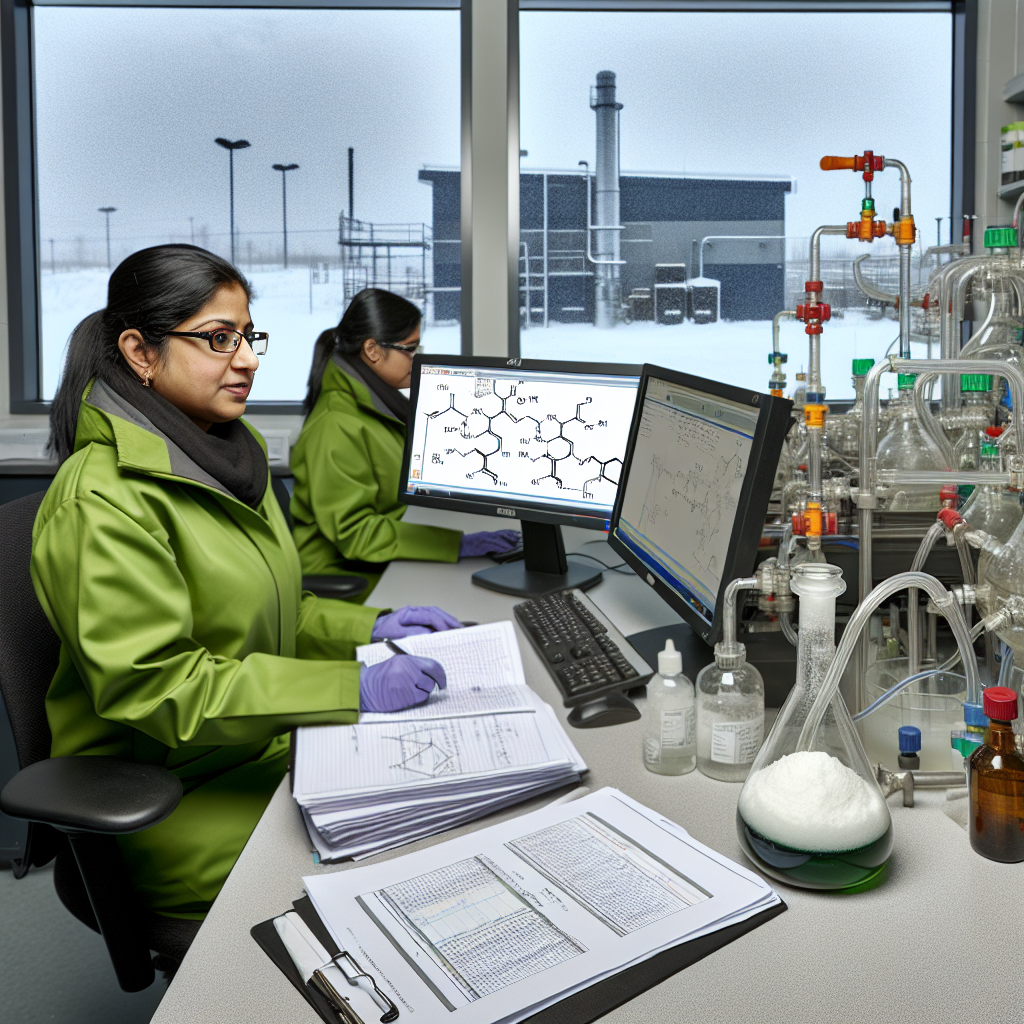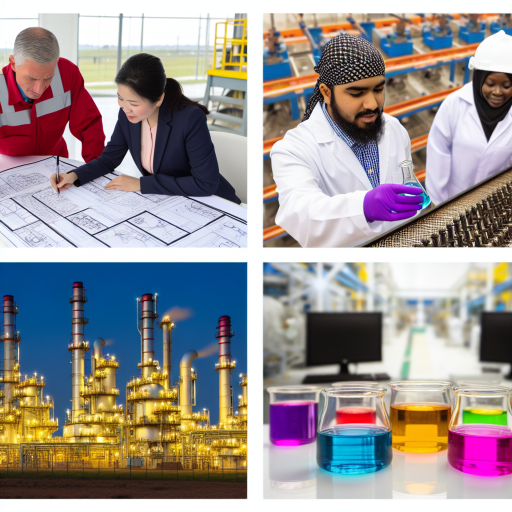Understanding Regulatory Compliance and Safety Standards
Importance of Regulatory Compliance
Regulatory compliance is vital for chemical engineers.
Noncompliance can lead to severe legal penalties.
Additionally, it may harm a company’s reputation.
Engineers must stay informed about relevant regulations.
Key Regulatory Bodies
Several organizations govern chemical engineering practices.
The Environmental Protection Agency oversees environmental regulations.
The Occupational Safety and Health Administration enforces workplace safety standards.
Each body has specific guidelines that must be followed.
Common Safety Standards
Safety standards ensure the protection of workers and the environment.
The American National Standards Institute defines essential safety protocols.
The International Organization for Standardization sets global standards.
Compliance with these standards significantly reduces workplace risks.
Challenges in Meeting Compliance
Meeting regulatory requirements can be complex for engineers.
Frequent updates to laws require constant monitoring.
Furthermore, interpretations of regulations may vary across jurisdictions.
This complexity can lead to unintentional violations.
Best Practices for Compliance
To enhance compliance, continuous training is essential.
Engineers should participate in workshops and seminars regularly.
Additionally, establishing a compliance management system can help.
Documentation and audits greatly improve adherence to standards.
Collaboration with Other Departments
Successful compliance involves teamwork across departments.
Collaboration between engineering and legal teams is crucial.
Moreover, communication with regulatory bodies promotes transparency.
This collaboration helps anticipate potential issues before they arise.
Navigating Complex Project Management and Deadlines
Understanding Project Complexity
Chemical engineering projects often involve intricate processes.
Unlock Your Career Potential
Visualize a clear path to success with our tailored Career Consulting service. Personalized insights in just 1-3 days.
Get StartedThese projects can span various disciplines and teams.
This complexity raises the need for effective communication.
Moreover, collaboration among different stakeholders is essential.
Managing Project Deadlines
Adhering to deadlines can be challenging for chemical engineers.
Unexpected challenges often arise during project execution.
Engineers must continuously monitor timelines for efficiency.
Additionally, prioritizing tasks becomes crucial to meeting deadlines.
Coordinating Multi-Disciplinary Teams
Teams usually consist of diverse professionals with unique expertise.
Aligning the goals of these individuals can be demanding.
Effective leadership is vital for fostering a collaborative environment.
Regular meetings help keep everyone updated on project progress.
Dealing with Resource Limitations
Resource constraints frequently complicate project management.
Engineers must find ways to optimize available materials.
Innovative problem-solving becomes necessary in these situations.
Establishing strong supplier relationships can ease resource challenges.
Adapting to Regulatory Changes
The chemical industry is heavily regulated for safety and compliance.
Engineers must stay informed about evolving regulations.
Adapting projects to meet new standards requires agility.
Continuous training helps engineers navigate regulatory landscapes.
Utilizing Project Management Tools
Effective tools streamline project management processes.
Software solutions can enhance communication and collaboration.
Automation tools reduce repetitive tasks, allowing more focus on analysis.
Furthermore, using project tracking systems ensures accountability.
Addressing Environmental Impact and Sustainability Goals
Understanding the Role of Chemical Engineers
Chemical engineers play a vital role in promoting sustainability.
They develop processes that minimize waste and energy consumption.
Furthermore, they design products that are environmentally friendly.
Identifying Key Challenges
One significant challenge is reducing greenhouse gas emissions.
Chemical engineers must find ways to limit pollutants during production.
Additionally, they grapple with compliance to government regulations.
Staying updated on these regulations can be demanding.
Implementing Sustainable Solutions
Developing sustainable processes requires innovative thinking.
Engineers often utilize alternative raw materials to minimize impact.
They also focus on recycling waste materials into useful products.
For instance, using carbon capture and storage technologies helps reduce emissions.
Fostering Collaboration Across Industries
Collaboration enhances the development of sustainable technologies.
By partnering with environmental scientists, chemical engineers can share knowledge.
This partnership leads to new methods that benefit the planet.
Moreover, industry collaboration can address sustainability challenges more effectively.
Educating Future Generations
Education is crucial for fostering a sustainable mindset in future engineers.
Curricula must include sustainability principles and practices.
Internships offer practical experiences that emphasize environmental impact.
Engaging with professionals in the field provides valuable insights.
Find Out More: The Role of Biomedical Engineers in Revolutionizing Canada’s Healthcare Solutions
Integrating Advanced Technology and Innovation in Processes
Embracing Automation in Chemical Engineering
Automation transforms traditional chemical engineering practices.
It enhances efficiency and accuracy in processes.
Moreover, it reduces the risk of human error.
Companies like ChemTech Solutions adopt robotic systems.
These systems streamline production lines effectively.
In addition, they collect crucial data for analysis.
Incorporating Data Analytics
Data analytics significantly influences chemical engineering decisions.
Engineers utilize analytics to optimize production processes.
They examine historical data for better forecasting.
Predictive analytics helps anticipate equipment failures.
This approach minimizes downtime and maintenance costs.
With companies such as DataChem Analytics, efficiency leads the way.
Advancing Sustainability through Technology
Sustainable practices are essential in modern chemical engineering.
Innovations in technology support environmentally friendly processes.
New materials reduce waste and energy consumption.
For instance, GreenChem Innovations specializes in eco-friendly products.
They focus on renewable resources and waste reduction.
Furthermore, regulatory compliance is more easily achieved.
Utilizing Artificial Intelligence
Artificial intelligence provides analytical insights for engineers.
AI streamlines complex decision-making processes.
It assists in process optimization beyond human capabilities.
Companies like SmartChem Technologies implement AI solutions regularly.
These advancements lead to increased profitability and reduced costs.
Continuous learning algorithms enhance efficiency over time.
Find Out More: Why Sustainable Engineering Jobs Are Canada’s Fastest Growing Field
Managing Interdisciplinary Team Collaboration and Communication
Importance of Interdisciplinary Collaboration
Interdisciplinary collaboration fosters innovation in chemical engineering projects.
It leverages diverse skills and perspectives for better problem-solving.
Incorporating input from various disciplines enhances the project outcome.
Moreover, it promotes adaptability in rapidly changing engineering environments.
Challenges in Team Dynamics
Challenges often arise from differing communication styles among team members.
These differences can lead to misunderstandings and conflicts.
Additionally, varied priorities and goals can hinder collaboration.
Team members may struggle to align their objectives, resulting in inefficiencies.
Effective Communication Strategies
Clear communication serves as the backbone of successful collaboration.
Establishing regular check-ins can help maintain alignment among team members.
Utilizing collaborative tools enhances transparency and information sharing.
Furthermore, setting clear expectations reduces ambiguities from the start.
Building Trust within Teams
Trust is essential for effective interdisciplinary teamwork.
Encouraging open discussions fosters a culture of trust and respect.
Acknowledging and valuing each member’s expertise is crucial in this process.
Team-building exercises can also strengthen interpersonal relationships.
Encouraging Inclusive Practices
Inclusive practices create an environment where everyone feels valued.
Facilitating diverse viewpoints leads to innovative solutions.
Moreover, incorporating feedback from all team members improves the project’s direction.
Companies should actively promote diversity to enhance team effectiveness.
Explore Further: Canada’s Green Energy Revolution: Engineering Jobs You Need to Know About

Dealing with Material and Resource Limitations
Understanding Resource Constraints
Chemical engineers often face material and resource limitations in their projects.
These constraints arise from availability, cost, and regulatory requirements.
Notably, limited resources can hinder project timelines and budgets.
To address these issues, engineers must plan efficiently from the outset.
Impact of Material Availability
The availability of raw materials affects chemical engineering processes significantly.
For instance, scarcity of certain chemicals can alter production plans.
Engineers often need to explore alternative materials to maintain workflows.
Utilizing substitutes can help to stabilize costs and meet deadlines.
Cost Management Strategies
Effective cost management is crucial for project success.
Engineers regularly analyze costs related to material procurement and logistics.
Negotiating contracts with suppliers can reduce expenses significantly.
Additionally, value engineering techniques can enhance cost efficiency.
Navigating Regulatory Challenges
Regulatory bodies impose strict guidelines on material usage and safety.
Understanding these regulations is essential for compliance and risk management.
Engineers should keep abreast of changes in legislation affecting their materials.
This vigilance helps avoid costly penalties and project delays.
Innovative Solutions to Material Limitations
Innovation plays a vital role in overcoming material limitations.
Chemical engineers increasingly adopt sustainable practices to optimize resources.
For example, recycling and reusing materials can reduce dependency on virgin resources.
Implementing advanced technological solutions further enhances efficiency.
- Process optimization through simulation software helps identify bottlenecks.
- Green chemistry principles guide material selection to minimize waste.
- Collaboration with multidisciplinary teams fosters creative problem-solving.
Explore Further: How Civil Engineering Careers Are Shaping Canada’s Future
Mitigating Risks Associated with Chemical Processing
Understanding Chemical Hazards
Chemical engineers must identify potential hazards in processing plants.
These hazards can arise from chemical reactions, equipment failure, or human error.
Moreover, understanding the nature of these hazards is critical for safety.
Engineers should conduct thorough risk assessments regularly.
They can employ tools such as hazard identification techniques and risk matrices.
Implementing Safety Protocols
Establishing robust safety protocols is essential in chemical engineering.
Proper safety measures help to mitigate the risks associated with chemical processing.
Engineers must ensure that all employees receive adequate training on safety practices.
Regular drills can reinforce the importance of following safety protocols.
Additionally, communication channels must remain open for reporting hazards.
Utilizing Technology for Risk Management
Employing advanced technology enhances risk management in chemical engineering.
Simulation software can predict outcomes of chemical reactions under various conditions.
This technology also assists in designing safer processes and equipment.
Furthermore, automated monitoring systems can detect anomalies in real time.
Investing in technology improves safety and operational efficiency.
Promoting a Safety Culture
A strong safety culture within the organization is vital for reducing accidents.
This culture encourages employees to prioritize safety in their daily tasks.
Leadership plays a key role in promoting safety attitudes among workers.
Regular safety meetings can strengthen this culture and keep safety at the forefront.
Moreover, rewarding safe behavior helps to instill a commitment to safety across the organization.
Continuous Improvement and Training
Continuous improvement processes are vital in managing risks effectively.
Feedback mechanisms should be in place to learn from past incidents.
This feedback aids in refining safety protocols and response strategies.
Additionally, regular training sessions ensure employees stay updated on best practices.
Incorporating lessons learned into training programs is crucial for ongoing safety education.
Adapting to Continuous Learning and Skill Development in Evolving Industry
Embracing Lifelong Learning
Chemical engineers face rapid advancements in technology.
Adapting to these changes requires a commitment to lifelong learning.
Online courses offer flexible options for skill enhancement.
Workshops and webinars can provide valuable insights into emerging trends.
Additionally, professional organizations often host training programs.
Staying Updated with Industry Trends
Industry trends shift frequently due to innovations.
Reading industry journals keeps engineers informed about new research.
Networking with peers at conferences enhances knowledge sharing.
Social media platforms can connect engineers with industry leaders.
Furthermore, participating in forums encourages discussion about best practices.
Developing Technical and Soft Skills
Both technical and soft skills are essential for success.
Technical skills ensure engineers remain competitive in their field.
Soft skills, such as communication, foster better teamwork.
Workplace challenges often require problem-solving and adaptability.
Thus, engineers should seek opportunities to enhance these abilities.
Leveraging Mentorship Opportunities
Mentorship can provide invaluable guidance to chemical engineers.
Experienced professionals can offer insights about career progression.
Mentors can help navigate challenges and identify growth areas.
Moreover, building relationships with mentors can expand professional networks.
A strong mentorship bond may lead to future career opportunities.
Certification and Further Educational Pursuits
Pursuing certifications enhances credibility in the engineering field.
Various organizations offer specialized certifications for engineers.
Advanced degrees can open doors to higher-level positions.
Investing in education often results in improved job prospects.
Companies value employees who prioritize professional development.
Additional Resources
About – Faculty of Applied Science & Engineering
Technology to Reduce the Impacts of Wildfires | Homeland Security




